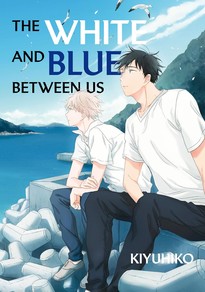Review
by Rebecca Silverman,The White and Blue Between Us
Manga Review
| Synopsis: |  |
||
Seven years ago, Hozumi lied. He told his boyfriend Mishima that he'd never loved him, then packed up and left the island where they grew up. Now Hozumi has returned, and he's not only battling his lingering feelings for Mishima, he's also aghast to discover that his ex-boyfriend has become a recluse, shutting himself up in the lighthouse he's the keeper of. Is it too late for Hozumi to admit his lie? Or did he truly ruin everything seven years ago? The White and Blue Between Us is translated by Leo McDonagh and lettered by Nicole Roderick. |
|||
| Review: | |||
So many love stories in fiction begin or end with a lie. That's not surprising when you think about the genre; its very nature means that any antagonistic actions need to be either ridiculously huge (kidnapping, war, etc.) or small enough to be a fixture of everyday life that takes on outsize importance between the protagonists. The White and Blue Between Us follows the latter path – the story hinges on a lie told by Hozumi to his high school boyfriend Mishima seven years before the plot opens, and the fallout from it informs all of the young men's actions. The lie in question was, as they so often are, well-intentioned. Hozumi and Mishima grew up on a small island, and having lived on one, I can tell you that they're very often closed worlds. While Mishima seems content to succeed his grandfather as the lighthouse keeper, Hozumi wants to spread his wings. He worries that their relationship will hold both of them back, and so he tells Mishima that he was lying when he said he loved him. Then he graduates and moves off-island, not returning for seven years. Even though he's never gotten over or forgotten Mishima, he believes he's done the right thing, giving both of them the chance to grow. Regretfully, the one thing he didn't count on is that people are under no obligation to react the way you assume they will, and not telling the truth comes with some hefty consequences. Although Hozumi has been hurting, he's been balancing that pain with the knowledge of why he acted as he did. As far as Mishima knows, his beloved boyfriend dumped him suddenly after announcing that he never loved him, and that's not the sort of pain that easily goes away with time. Somehow this never occurred to Hozumi, and when, after seven years, he returns from Tokyo to his hometown, he's horrified to learn that not only has Mishima not left the island, but he's shut himself away in the lighthouse he tends, the exact opposite of how Hozumi hoped he'd react. As a romance setup, this isn't bad. The so-called “second chance romance” subgenre has a lot of fans, and this one has plenty of the elements that make it popular, most notably the fact that neither Hozumi nor Mishima has truly gotten over their earlier relationship. Mishima has essentially become stuck in time, frozen in the moment Hozumi dumped him, and when Hozumi suddenly bursts back into his life, he's not sure how to react. This is further exacerbated by the fact that not only was Hozumi his first boyfriend, but he was also his first friend, so the betrayal is even deeper than it first appears. There's plenty to mine from this concept, and the book does an okay job of it, but the problem is that this is only a one-volume story. It simply doesn't have the space to give us the needed depth of emotion, especially for Mishima. That leaves The White and Blue Between Us feeling like a surface-level story. We know the basic beats of their relationship, both past and present, but there's not enough space to give us a full picture. We know Hozumi's reason but we don't fully understand it. The same goes for Mishima – why was he such a lonely kid? Was it his grandfather's fault? How did he react to Hozumi's betrayal? Did he want to take over the lighthouse, or was it fully out of a sense of familial obligation? All of these answers would substantially improve the story and make the resolution more rewarding. It's not a bad book by any means, but it could easily have been a better one. That goes for the art as well – it's not unpleasant or bad, but it's a bit awkward around chins and faces, and the perspective frequently feels off. All of this adds up to a book that can't quite escape being merely “good enough.” For all of its issues, there is a real sweetness to this romance. That they manage to reconnect in the lighthouse is nicely symbolic: lighthouses are the marker between the land and the sea, and beacons are meant to keep sailors safe and guide them back to the harbor. Ultimately, that's what their relationship is for both of them – a safe space and a beacon to bring them back to a place where they can be happy. That makes it easier to ignore shortcomings in the writing and art and the idea of a manned lighthouse still existing in 2018; there are a couple, but almost all lighthouses today are automated. It's a nice book for a little break from the world, but not much more than that. |
| Grade: | |||
|
Overall : C+
Story : C+
Art : C
+ Sweet story with some nice symbolism. |
|||
| discuss this in the forum | | |||
| Production Info: | ||
|
Full encyclopedia details about |
||